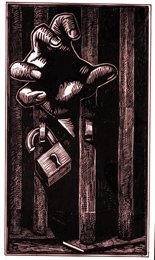
Nat Hentoff
http://www.jewishworldreview.com --
AROUND THE COUNTRY, 24 immigrants, most of them Muslim or of Arab
descent, are being detained -- that is, imprisoned -- by the Immigration
and Naturalization Service, which intends to deport them.
None of them, nor any of their lawyers, has been allowed to see the
evidence against them or to confront their accusers. This denial of
fundamental due process is justified on the grounds of national security.
In 1996, the president signed the Anti-Terrorism and Effective Death
Penalty Act, which authorized secret evidence. A federal district judge in
Newark, N.J., William Walls, has now described this as "government
processes initiated and prosecuted in darkness." (The use of secret
evidence, however, goes back to the 1950s).
Although many active lawsuits, in various stages, are attacking this use of
secret evidence, Judge Walls is the first jurist to flatly declare the use of
such evidence unconstitutional.
His decision was in the case of Hany Mahmoud Kiareldeen, a Palestinian
who has been in this country for nine years, managed an electronics store
in New Jersey and is married to an American citizen.
First arrested for having an expired student visa, he later was accused of
meeting in his New Jersey home, a week before the 1993 World Trade
Center bombing, with one of the men convicted in that attack. He also was
accused of threatening to kill Attorney General Janet Reno.
The source of this classified evidence is the FBI's Joint Terrorism Task
Force. But, as Judge Walls has noted, the INS failed to produce any
witnesses -- either from the FBI or from the INS -- or "original source
material" in support of these charges. Therefore no witnesses could be
cross-examined at the hearings.
At the hearings, Kiareldeen produced witnesses and other evidence that he
was not living in the town where he is supposed to have met with bombing
conspirators. And an expert witness, Dr. Laurie Myleroie, appeared for
him. She is described by James Fox, former head of the FBI's New York
office, as "one of the world-class experts regarding Islam and the World
Trade Center bombing." She testified that no evidence showed that the
accused had any connection with that bombing.
The government's evidence, said the judge, failed "to satisfy the
constitutional standard of fundamental fairness." The INS -- part of the
Justice Department -- denied Kiareldeen's "due process right to confront
his accusers . . . even one person during his extended tour through the
INS's administrative procedures."
These due process protections, declared the judge, "must be extended to
all persons within the United States, citizens and resident aliens alike. . . .
Aliens, once legally admitted into the United States are entitled to the
shelter of the Constitution." The judge went even farther.
 |
In Rafeedie, Judge David Ginsburg noted in 1989 that the permanent resident alien in that case, in this country for 14 years, was "like Joseph K. in Kafka's 'The Trial' in that he could only prevail if he were able to rebut evidence that he was not permitted to see."
Kiareldeen is now free after 19 months, but Judge Walls's decision that secret evidence is unconstitutional applied only to the state of New Jersey. The INS did not pursue its appeal because it wants to avoid a Supreme Court decision. The INS continues to insist it will keep on using secret evidence.
One of the victims of these prosecutions in darkness still in prison is Nasser Ahmed, who has been in INS detention for 3 1/2 years.
Congress has the power to bring in the sunlight by passing the Secret Evidence Repeal Act of 1999 (H.R. 2121) -- introduced in June by Rep. David Bonior (D-Mich.). It would "abolish the use of secret evidence in American courts and reaffirm the Fifth Amendment's guarantee that no person shall be deprived of liberty without due process."
Will a bipartisan Congress vote in favor of the Constitution? And then, will the president allow the removal of the secret evidence provisions of his cherished 1996 Anti-Terrorrism
JWR contributor Nat Hentoff is a First Ammendment authority and author of numerous books. Send your comments to him by clicking here.
11/02/99: The accuracy that's owed to readers
10/26/99: Disappeared Americans
10/18/99: The blue wall of silence
10/11/99: Bill Bradley's speech tax
10/04/99: 'Technicalities' that keep us free
09/27/99: Our 'Americanism'-ignorant generation
09/20/99: ACLU better clean up its act
09/13/99: A professor of infanticide at Princeton
09/07/99: The Big Apple's Rotten Policing
08/23/99: Lawyerly ethics
08/16/99: To Get a Supreme Court Seat
08/02/99: What are the poor people doing tonight?
07/26/99: Lady Hillary and the press

